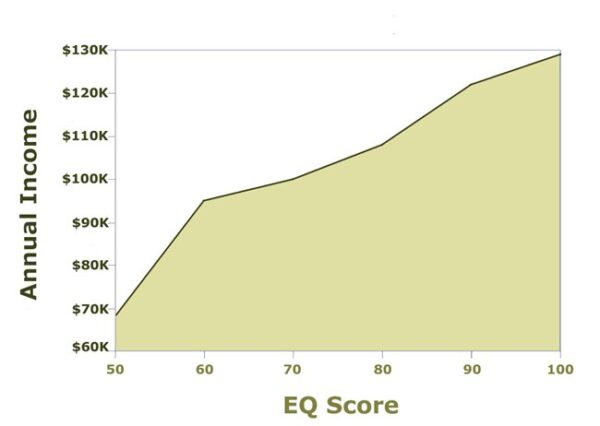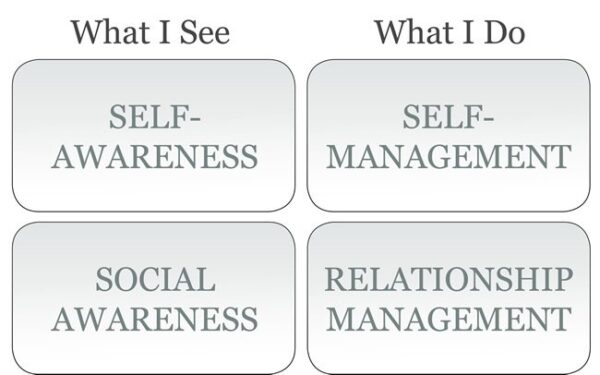Know anyone who wants to make more money? They’ll have to get in line. I think we’d all be hard-pressed to find a coworker, family member or friend who wouldn’t like to make more money. The trouble with earning more money is that it often requires a great sacrifice. With a higher salary come the demands of longer hours and stress by the shovel-load. Quality time with friends and family falls by the wayside.
What if I told you there is a direct route to a higher income that improves your relationships at work and home? Does it sound too good to be true? It isn’t. New TalentSmartEQ® research shows that the road to higher income is paved with the quality of your relationships. People earn more money as they become more emotionally intelligent.
Linear Relationship Between EQ and Salary
In a recent study, using the Emotional Intelligence Appraisal®, we tested the emotional intelligence (EQ) of over 42,000 people, and compared their scores to their annual incomes. We found that people with high EQs make an average of $29,000 per year more than people with low EQs. On average, every point increase in emotional intelligence adds $1,300 to an annual salary.

Annual salary by emotional intelligence (EQ) score: the strong, linear relationship between EQ and salary shows that—regardless of the current EQ score—increasing EQ equals a higher salary.
Emotional intelligence is made up of four skills that represent the other side of smart—all the intellect (IQ) in the world won’t make you any more emotionally intelligent. And, unlike regular IQ, EQ skills are flexible enough that they improve with effort.

1. Self-Awareness
Your ability to accurately perceive your own emotions in the moment, and understand your tendencies in different situations.
2. Self-Management
Your ability to use your awareness of your emotions to stay flexible, and direct your behavior positively.
3. Social Awareness
Your ability to accurately pick up on emotions in other people, and understand what is really going on with them.
4. Relationship Management
The application of the first three EQ skills; this is your ability to use your awareness of your own emotions and those of others to manage interactions successfully.
There is a good chance you’re already aware of some of the benefits of developing EQ skills. You know that people with a keen awareness of their own feelings and tendencies—and an understanding of other people’s subtle emotional cues—are vital to the success of any organization. Yet, from talking to our customers and certified trainers, too many people in the working population are unable to put the power of EQ to work for them. Some talk a good game and make vague references to the “importance of people,” but when the rubber meets the road they don’t make developing their EQ a priority. Others treat EQ as a luxury that they’ll get to if or when they finish their “real work.” Still others harbor a darker belief somewhere in the recesses of their minds that EQ skills are only for the weak. Sure, it might help people be nicer to each other, but so what? In large part, people won’t work on their EQ skills because they need an answer to the age-old question: What’s in it for me?
Now, you have the answer.
If you fear the company’s best interests aren’t sufficient motivation to light a fire under those you’re trying to teach, ask them to imagine a beefed-up personal bank account. Never mind that a higher EQ will make people better managers. Forget the fact that EQ equips people to lead effectively, and pay no heed at all to the undeniable truth that EQ makes a better salesperson. Forget it all, and ask people one simple question: Would you like to make more money?
Of course, people with more EQ make more money precisely because it helps them to do their job more effectively. They make more money because they bring more value to their company. They communicate better. They perform better under stress. They make their teams more productive. They make better decisions without any hidden feelings clouding their judgment. The list of ways in which emotionally intelligent individuals help their organizations prosper goes on and on.
Even though EQ is important to your organization, this may not always resonate with those who need it the most. So, let the impact that EQ has on organizations be our little secret. Let the dog-eat-dog-world types discover that truth on their own. In the meantime, our job is to motivate people to want to develop their EQ skills. To that end, money talks.
ABOUT THE AUTHOR:
Travis Bradberry, Ph.D.
Dr. Travis Bradberry is the award-winning co-author of the #1 bestselling book, Emotional Intelligence 2.0, and the cofounder of TalentSmartEQ, the world’s leading provider of emotional intelligence tests and training, serving more than 75% of Fortune 500 companies. His bestselling books have been translated into 25 languages and are available in more than 150 countries. Dr. Bradberry has written for, or been covered by, Newsweek, BusinessWeek, Fortune, Forbes, Fast Company, Inc., USA Today, The Wall Street Journal, The Washington Post, and The Harvard Business Review.